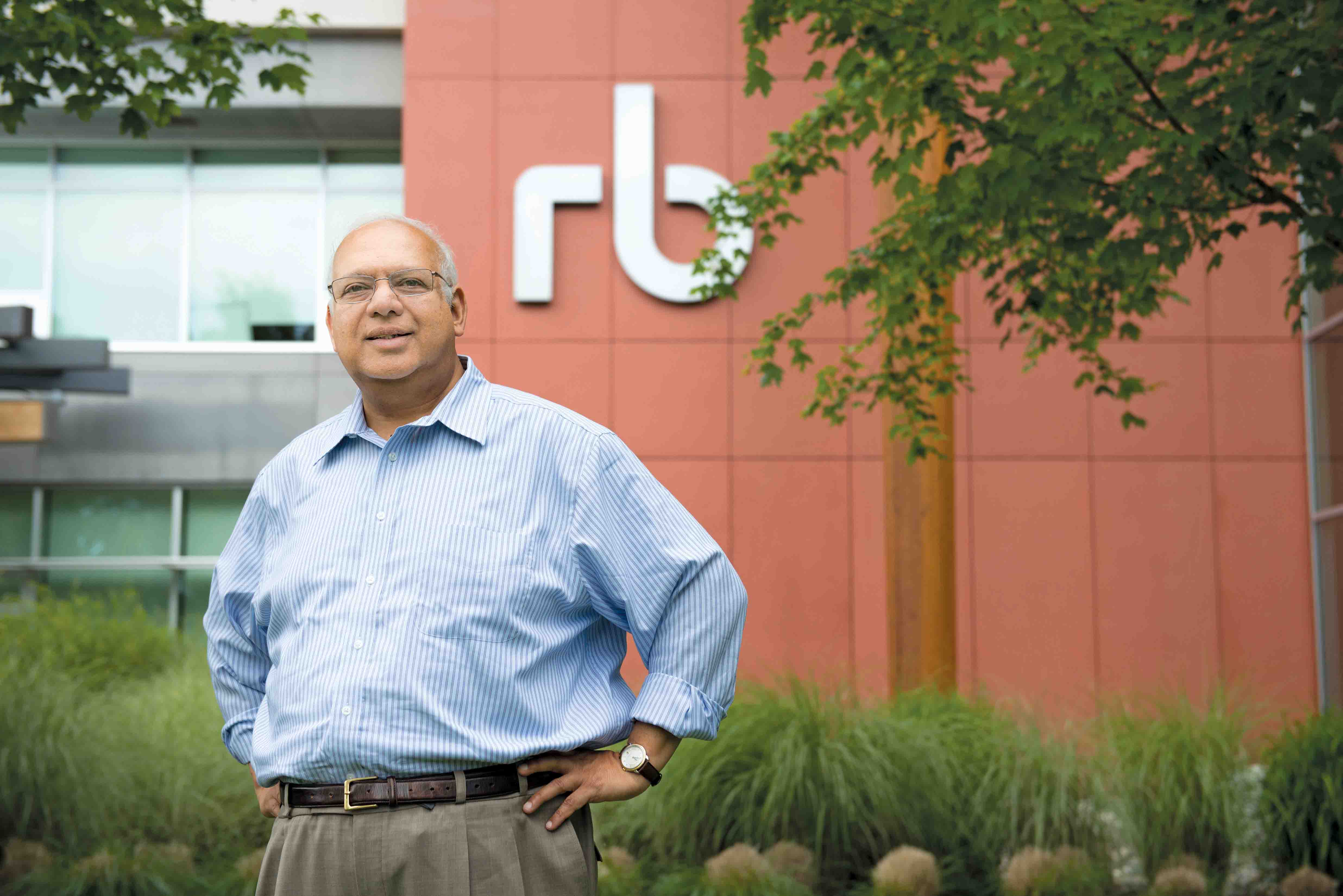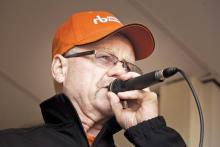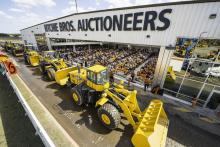
Everybody wants a bargain, whether it’s a pair of socks or an excavator. Ritchie Bros. chief executive Ravi Saligram tells David Arminas why people love auctions
People go to equipment auctions because of a business need and but also for a thrill, says Ravi Saligram, chief executive of
Bidding is very fast, he tells World Highways. “It could be a million dollars or $10,000 worth of equipment, but both lots sell in typically in less than 60 seconds. You create the excitement. Everyone wants a good deal, and they want to win.”
Saligram accepted the chief executive role for the New York and Toronto Stock Exchanges-listed company in July 2014, although he freely admits that he had never heard of the business. But Saligram knows about bargains and loves them. In fact he, loves creating them. It was the challenge of making a good business model even better in an age of expanding internet use.
Prior to joining RBA, he masterminded the turnaround of Florida-based OfficeMax. Before he took over the office supplier, the business was closing depots at an alarming rate and laying off staff. Saligram stemmed the haemorrhaging of cash and successfully merged it with its rival Office Depot.
After OfficeMax, he was looking for a new challenge and found it in RBA, not that the company was in any trouble, he says. Far from it. RBA’s efforts on behalf of sellers – and buyers, he insists – generated around US$4.3 billion in sales in the past year. But the world of selling, including auctions, was changing and Saligram saw potential to expand the business beyond that of simply on-site unreserved auctions – a product offering that was, and continues, to serve the business and its customers well.
Saligram’s outlook has always been global. The 60-year-old was born in New Delhi and holds an electrical engineering degree from Bangalore University, as well as MBA from the University of Michigan, in the US city of Ann Arbor. He held various brand management roles at cleaning products supplier S.C. Johnson in the United States and overseas. Saligram also worked in senior management positions with global food services provider Aramark. For years he was with InterContinental Hotels where his roles included president of brands and franchise for North America, as well as managing director for global strategy.
Soon after coming on board at RBA, he appointed three regional business leaders. He later told investors, in January 2015, that he had put in place “a strong data-centric, customer-focused leadership team to exploit new channels, models and services and increase market share”.
Multiple channels
Auction houses, in no matter what market, he explains, all face the challenge of customers having multiple ways of selling and buying goods, much of it thanks to the expanding use of the Internet. There is a lot at stake for all auction houses.
“The used heavy equipment market is big, around $360 billion globally, across construction, transportation, agriculture, oil and gas, mining and more. RBA is doing only $4.2 billion, so how do we get more market penetration? Historically, auctions were sometimes seen as the last resort for people. We want to create a good customer experience and value for buyers and sellers, so RBA becomes the preferred choice,” he says.
A lot depends on one word. “Trust. And that is all about transparency based on the unreserved auction model. We are pioneers and remain global leaders in this. The seller cannot put a minimum price on the unit. Reserve auctions have a threshold, a minimum selling price to be reached. We had have never done live reserved auctions because, in our opinion, unreserved is the ultimate in guarantor of transparency for buyers. They know that they will get a price that the global market can bear on that particular day. Remember, too, just because it’s unreserved doesn’t mean it will go for a low price than if there were a reserve price on it.”
The main point is simple: “Sometimes the market favours you and sometimes it doesn’t.” That, he says, is the thrill of an auction.
• Ritchie Bros. EquipmentOne – Online auctions with items listed for sale or bids placed any time
• Ritchie Bros. Private Treaty - Confidential negotiated sales for high-value equipment
• SalvageSale.com - Online site for selling salvage and insurance assets via sealed-bid auctions
Worldwide sales in 2015:
• $4.25 billion in total sales of assets
• $1.9 billion in online sales
• 354,500 items sold
• 345 unreserved auctions globally
An average industrial auction in 2015 was:
• 1,540 lots
• 200 sellers
• 2,200 on-site and online bidders
• $16.8 million worth of equipment soldEverything that RBA’s worldwide 1,500 employees do -- from sales, administration and marketing to auction-day performance -- is for customers.
The vision is moving from being the best auction company to being “the best multichannel provider of asset management and equipment disposition”, he says. “One of our biggest competitors is the private sell, where people put an advertisement in a magazine or on a listing service, or even if they park their machine by the roadside with a sign on it saying it’s for sale.”
Saligram believes that there is a “very small segment” of sellers who are concerned about unreserved auctions. “So we realised that there is a place for a reserved auction format which is why we have Equipment One, a purely online but mostly reserve model.”
In the 12 months to the first quarter 2016, RBA as a group took in about $4.3 billion gross. Out of that around $100 million was from Equipment One. “With Equipment One, you don’t need to move the equipment anywhere, which can be a big advantage for some customers. It might be mining equipment that is still underground or other heavy equipment that logistically is difficult to move.”
Hunting for bargains
As part of its commitment to on-line transactions, last November RBA acquired 75% interest in Xcira, which for the past 14 years has been supplying the auctioneer with online auction software. In 2014 alone, nearly $1.7 billion of equipment and other assets were sold through Ritchie Bros. auctions transacted in some form on Xcira’s "Online Ringman" software. Xcira, based in Tampa, Florida, also supplies technology services to many other auction companies outside of the industrial sector.
In February, RBA acquired 100% of the Netherlands-based online equipment listing service Mascus for $26.6 million. Mascus, which continues to operate under its branding and management team, lists more than 360,000 items for sale. It gets around 3.2 million monthly website visits originating from 58 countries and in 42 languages.
“It’s a great medium for connecting sellers and buyers and they do the transactions themselves. It is simply another channel that customers want. With our expanded vision we want customers to buy and sell how and where they want, when they want and through which channel they want. That’s customer centricity,” says Saligram. “We don’t want to be a one-trick pony.”
That expanded vision allowed Ritchie Bros to further extend its offering through the acquisition of
RBA has 44 permanent auction sites in 19 countries in North America, Europe, the Middle East, Asia and Australia. RBA still gets around 80% of its business in North America, including Mexico and Panama.
But some markets are more resistant to heavy equipment auctions than others, says Saligram. RBA used to hold auctions in India, but now only sources equipment from the Sub-continent for auctioning at its permanent site in Dubai.
“In India, China or Japan, one of the difficulties is not so much the [auction] competition, but the unreserved model; it is not that well received. We shouldn’t be one-size-fits-all. Some consigners want more control over pricing or location. Also, Japan is not so much a used-equipment market. Japan is, however, a great exporter of used equipment. It’s a good source market. We did have auctions there last year sent by the region’s new head of the operations who studied in Japan, got his MBA in Japan and speaks Japanese.
RBA recently did some offsite auctions in Romania and Finland and held their first auction in New Zealand in 2015. Also in Europe last year, RBA began piloting Ritchie Bros Logistics to make it easier for customers to send equipment around the world. “We won’t get into the shipping business, but we can vet shippers and help customers get the best value deals.”
In Latin America, RBA has a permanent facility in Polotitlan, a small town near Mexico City. “Latin America is an important market for us and we also have an auction site in Panama. But for the rest of Latin America, we just source equipment and bring it either to Panama or Mexico or sometimes on to Dubai. A lot of this equipment is not TIER 4 so it would not be allowed into the US.”
Generally speaking, attendees for the North American auctions will be from the host country or close countries, like Canada and the US. For example, we get a lot of people from Latin America coming to our auction site in Orlando, Florida, but also from Europe.
As the year draws to a close, Ritchie Bros. can congratulate itself on some pretty nice bargains for itself. The coming year will be a period of consolidating the increased offering to clients with the purchases Mascus and IronPlanet. But, as Saligram himself says, everybody loves a bargain, and continually so. The question for 2017 is, who will be next.
IronPlanet acquisition
IronPlanet was set up in 1999 and focuses on corporate accounts, equipment manufacturers, dealers and government agencies. Sales are primarily through online-only platforms, with weekly online auctions and in other equipment marketplaces.
IronPlanet’s online-only auctions, includes a Reserved Daily Marketplace & Buy-Now formats. The company also provides Cat Auction Services live onsite and online simulcast auctions - auctions anchored by Caterpillar dealers. For the oil and gas industry, there is Kruse Energy & Equipment Auctioneers live onsite and online simulcast auctions.
In 2015, IronPlanet had sales of around $787 million of gross merchandise value (GMV) through their sales channels during 2015, according to a joint statement at the time.
The company had a 25.2% compounded growth rate in assets sold from 2013 through 2015. This growth momentum has continued, with a 41% increase in GMV during the first half of 2016 relative to the same period in 2015.
The purchase was “the logical next step” for RBA, says Saligram. “Our commitment to diversifying our offerings is directly in line with customer demand for multiple selling and buying solutions. This acquisition will help accelerate our growth in revenue and earnings and add shareholder value by continuing to expand our capabilities in new channels, sectors, regions and customer segments."







